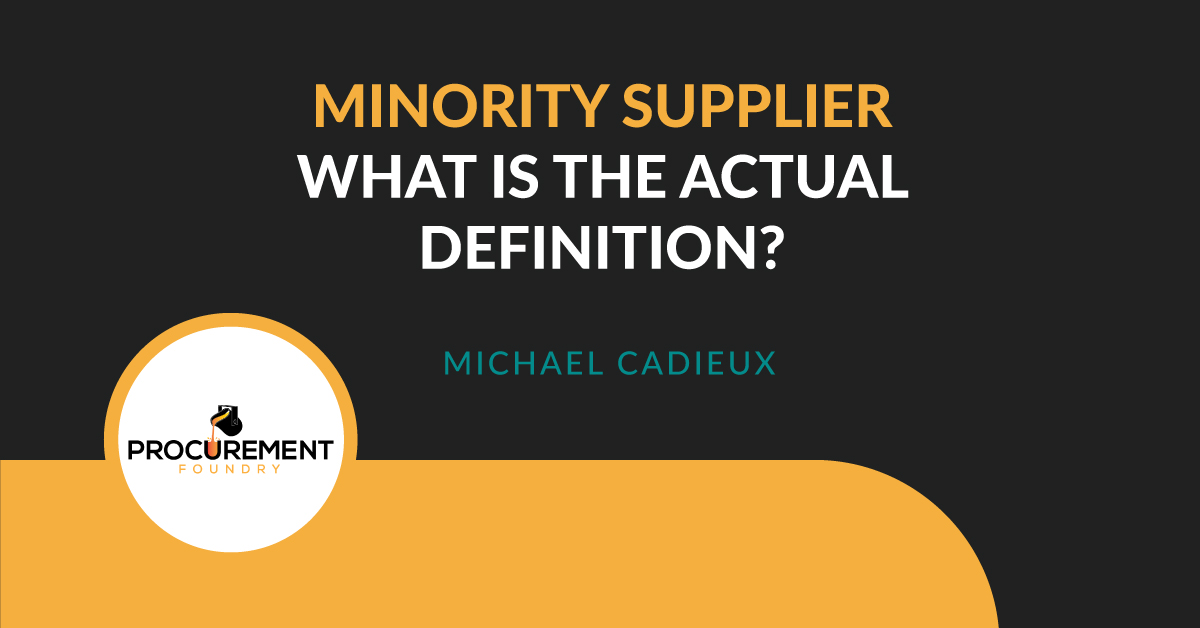Maximizing Savings Opportunities and Procurement's Strategic Value for CPOs
Saving money is not always about pinching pennies: advanced and data-driven insights enable you to identify real cost-saving opportunities, negotiate...

There are many buzzwords and trending topics in procurement today, supplier diversity being among the top of the list. But is it just lip service? Furthermore, how are organizations defining what a minority supplier is? We discuss this and more, including how we can all move forward with better policies for DE&I (Diversity, Equity, and Inclusion).
You likely hear the term “supplier diversity” everywhere you turn these days, but what exactly does it mean? Generally, it’s a business strategy that an organization adopts, where it commits to having a diverse supplier base for the procurement of goods and services.
When we talk about supplier diversity, we are referring to a supply chain that involves businesses owned by diverse individuals or minority groups. So, what exactly qualifies one as a diverse supplier, also known as a minority supplier?
On its most basic level, a diverse supplier—or minority supplier—is a business or organization owned and operated by an individual or entity/group that is traditionally considered underrepresented or underserved. Beyond this basic definition, however, there are many more categories that these diverse suppliers are grouped into.
For example, in the United States alone, upwards of around 16 categories are used to identify diverse businesses. These include the commonly seen small-business enterprises (SBEs), minority-owned business enterprises (MBEs), and woman-owned business enterprises (WBEs), to name a few.
There are even certifications suppliers can acquire from third-party agencies that authenticate them as a business owned, managed, and controlled by a qualifying diverse group. In this way, the organizations incorporating these suppliers in their supply chain can officially confirm that they are using diverse suppliers meeting the official criteria. It’s all about compliance and accountability.
This also helps exponentially when an organization is looking to open doors for getting government contracts. Organizations like the National Minority Supplier Diversity Council (NMSDC), the National LGBT Chamber of Commerce (NGLCC), the Women’s Business Enterprise National Council (WBENC), and the U.S. Department of Veterans Affairs Vets First Verification Program place a high priority on only working with businesses that can show proof of being nationally recognized for diversity by third-party certification services.
Now that we have explained what minority suppliers are and how they’re identified, the question remains: WHY should organizations use minority suppliers? Everyone is talking about Diversity, Equity and Inclusion (DE&I)—but why is it so important?
At its most basic level, enlisting minority suppliers and increasing diversity in the supply chain is just the right thing to do. But there are many more reasons for organizations to make inclusive supply chains a top priority, spanning from social responsibility to a better bottom line. In a perfect world, improving supplier diversity by incorporating minority suppliers provides the best of both worlds. That is, our desire to do and be better by creating a more equitable corporate landscape and being a competitive leader forging ahead into the future.
Supplier diversity adds value by supporting the growth of diverse businesses, which fuels the overall economy (increases economic impact) and positively impacts communities. Statistics show how great an economic impact supplier diversity can bring, with CVS Health reporting its 2018 diverse spend contributed $5.5 billion to the U.S. economy and sustained 31,095 jobs. And that’s just one example.
Supplier diversity also brings the benefits of increased innovation, widens channels for procurement to draw from, fuels competition (great for pricing especially), and allows for expansion across the globe. It’s also more profitable.
According to a Forbes article, diverse cultures in the workplace foster connections, increase acceptance and tolerance, create trust and improve morale. They can also exponentially benefit a business’ bottom line. Statistics from a study by McKinsey clearly show that those organizations prioritizing diversity outperformed their competitors by an impressive 33%. These organizations embracing diversity are 21% more likely to experience above-average profitability.
The Hackett Group showed that when companies increase their diverse spend, they see an increase in market share. According to a study by The Hackett Group, “companies that allocate 20% or more of their spend to diverse suppliers attribute 10%-15% of their annual sales to supplier diversity programs. Conversely, companies that direct less than 20% of spend to diverse suppliers attribute under 5% of sales to their supplier diversity program.”
All of this proves that doing the right thing really does pay off—in more than one way. For more information and support, join the Foundry today.

Saving money is not always about pinching pennies: advanced and data-driven insights enable you to identify real cost-saving opportunities, negotiate...

The topic of our recent roundtable discussion with a dozen Procurement Foundry community members—exploring potential flaws in procurement incentive...

Every 30 days or so, I get the same alert on my phone—“Your electricity bill is available for viewing.” I take a quick look, make sure nothing seems...